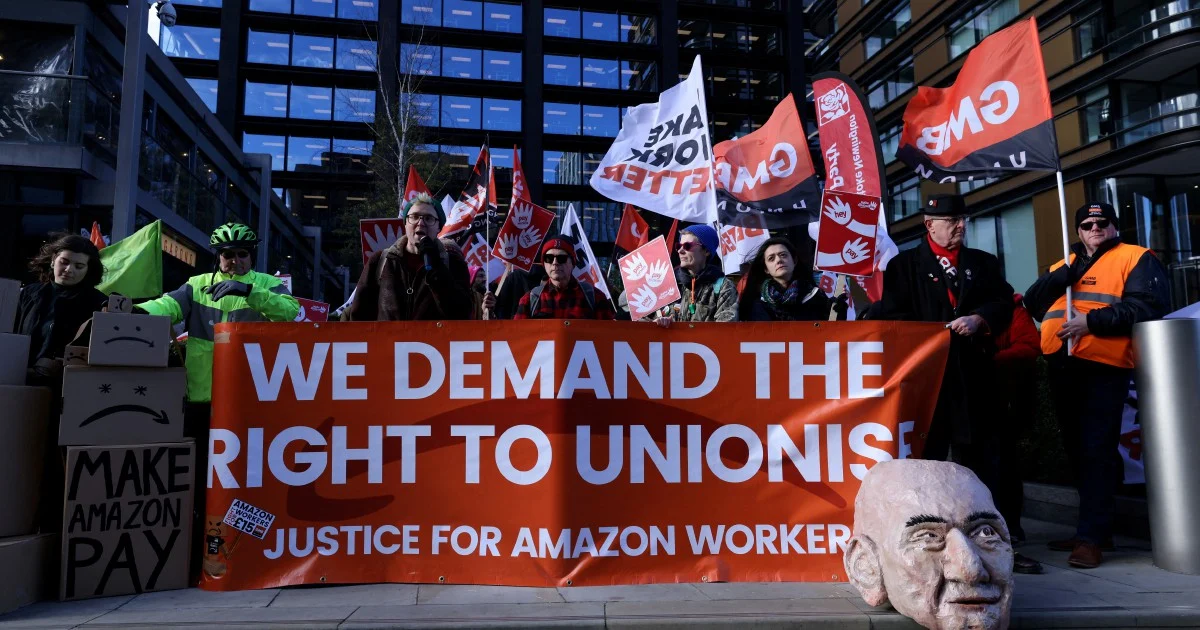
Amazon employees in over 20 countries are gearing up for coordinated protests and strikes on Black Friday, marking one of the busiest shopping days of the year.
The action, organized by UNI Global Union and Progressive International, seeks to address concerns about labor practices, environmental impact, and corporate accountability. This year’s demonstrations will extend through Cyber Monday, another peak shopping day, aiming to amplify demands for systemic changes within the retail giant.
The “Make Amazon Pay” campaign is at the forefront of these efforts, uniting over 80 unions, environmental groups, and activist organizations worldwide. Participants, including workers from countries such as Germany, the United States, Japan, and Brazil, are demanding fair wages, improved working conditions, respect for unionization rights, and stronger commitments to environmental sustainability. Protesters are also calling for Amazon to pay its fair share of taxes and address what they describe as its “anti-worker and anti-democratic” practices.
Protests Spanning Continents
Strikes and demonstrations will take place in major cities across the globe. In Germany, thousands of warehouse workers from several cities, including Leipzig and Dortmund, are set to strike. In the UK, tax justice activists will protest outside Amazon’s headquarters in London, presenting a petition with over 110,000 signatures demanding an end to tax breaks for the company. Meanwhile, garment workers in Bangladesh and labor groups in New Delhi will rally against unsafe working conditions and climate-related challenges.
In France, the Association for the Taxation of Financial Transactions and Citizens’ Action (ATTAC) will host protests in multiple cities, while the UK-based GMB union plans an online rally for Amazon workers. Last year, hundreds of strikers in Coventry were joined by international union representatives, highlighting the global reach of the campaign.
“A Cost to Workers, the Environment, and Democracy”
Christy Hoffman, General Secretary of UNI Global Union, criticized Amazon’s business model, stating, “Amazon’s relentless pursuit of profit comes at a cost to workers, the environment, and democracy.” Hoffman emphasized the resilience of workers pushing for justice, despite the company’s extensive anti-union efforts. Varsha Gandikota-Nellutla of Progressive International added, “By uniting our movements across borders, we can force Amazon to change its ways.”
Amazon, however, defends its practices. A company spokesperson pointed to competitive pay, comprehensive benefits, and renewable energy initiatives as evidence of its commitment to workers and sustainability. Amazon also claims to be the world’s largest purchaser of renewable energy, although critics argue the company lacks interim targets for its 2040 net-zero emissions goal. According to the campaign group Amazon Employees for Climate Justice, Amazon’s annual carbon emissions have risen by 34.5% since 2019.
A Growing Movement
This marks the fifth consecutive year of global Black Friday strikes against Amazon under the “Make Amazon Pay” banner. Organizers say the protests symbolize a united call for change, aiming to hold Amazon accountable for its impact on workers and the planet. While Amazon continues to resist unionization efforts—spending millions on campaigns to dissuade organizing—the movement shows no signs of slowing.
With strikes and protests planned across continents, the coordinated action underscores growing concerns about Amazon’s influence and practices, pushing for a future that prioritizes fairness and sustainability over corporate profit.
Featured Image courtesy of HOLLIE ADAMS/REUTERS
Follow us for more tech news updates.
